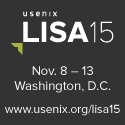32. Can you change all privileged (root) passwords in 1 hour?
This also indicates a lot more than what the question specifically asks. It indicates if your administrative access is well managed.
If you do not have this ability, create a checklist of everywhere it must be changed on a wiki page. Change the password globally by following the list, adding to it as you remember other devices. For obscure systems, document the exact command or process to change the password.
If you do have this ability, create a wiki page that documents how to activate the process (and then list all the exceptions that are still manual).
For More Information
See below links for more information on this topic:
- P2 - p. 223, Chapter 8: Namespaces
- P2 - p. 899, Chapter 36: Firing System Administrators
